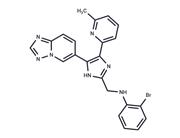| Name | Aprepitant |
| Description | Aprepitant is a Substance P/Neurokinin-1 Receptor Antagonist. The mechanism of action of aprepitant is as a Neurokinin 1 Antagonist, and Cytochrome P450 3A4 Inhibitor, and Cytochrome P450 2C9 Inducer, and Cytochrome P450 3A4 Inducer. |
| Cell Research | Aprepitant is dissolved in DMSO. The inhibitory effect of aprepitant on metabolic activity of Nalm-6 cells is assessed by uptake of thiazolyl blue tetrazolium bromide (MTT) by viable cells. Cells are plated onto 96-well plates at a density of 5000 cells/well. After treatment with aprepitant at 5, 10, 15, 20 and 30 μM for 24, 36 and 48 h, the cells are further incubated with 100 μL of MTT (0.5 mg/mL) at 37°C for 3 h. Untreated cells are defined as the control group. Following solubilization of precipitated formazan with 100 μL of DMSO, the optical densitometry is measured with an ELISA reader at a wavelength of 578 nm. |
| In vitro | Aprepitant plays a crucial role in the transmission of pain impulses from peripheral receptors to the central nervous system (CNS), engaging in various behavioral, neurochemical, and cardiovascular responses to stress. It can cross the blood-brain barrier and bind to NK-1 receptors in the brain. Aprepitant inhibits cytotoxicity induced by chemotherapy, such as acute and delayed vomiting caused by cisplatin (blocking Substance P). When administered at a dose of 3 mg/kg, either intravenously (i.v.) or orally (p.o.), Aprepitant effectively suppresses vomiting induced by cisplatin (10 mg/kg, i.v.). It enhances antiemetic effects when combined with dexamethasone (20 mg/kg, i.v.) or the 5-HT3 receptor antagonist ondansetron (0.1 mg/kg, i.v.) at a dosage of 0.1 mg/kg, i.v. In the acute delayed vomiting model in ferrets, nausea and vomiting responses were recorded for 72 hours following cisplatin administration (5 mg/kg, intraperitoneally [i.p.]). Pre-treatment with Aprepitant (4-16 mg/kg, p.o.) dose dependently inhibits vomiting induced by cisplatin. Complete inhibition of nausea and vomiting symptoms was achieved with Aprepitant (2-4 mg/kg/day, p.o.) in all administered ferrets. An acute phase of vomiting developed 24 hours after cisplatin injection, with Aprepitant administration (4 mg/kg, p.o.) at 24 and 48 hours post-injection suppressing 75% of nausea and vomiting symptoms in ferrets. |
| In vivo | Aprepitant exhibits a high degree of selectivity for human NK1 receptors, being 3000 times more selective than for human NK3 receptors, and 50,000 times more than for human NK2 receptors. It shows no activity in assays for monoamine uptake sites (NE, 5–HT, DA) using human and animal tissues (IC50 > 3 μM), nor in assays for human monoamine oxidase A and B, and human serotonin receptors 5–HT1A, 5–HT2A, 5–HT2c, 5–HT3, 5–HT5, 5–HT6, and 5–HT7 (IC50 > 3 μM). Aprepitant acts by binding to and antagonizing the substance P (SP) on both central nervous system (CNS) and peripheral NK-1 receptors. In CHO or COS cells, aprepitant displaces 50% of SP binding on hNK1 receptors at a concentration of 0.1 nM. Radio-ligand binding assays using primitive animal tissue have shown that aprepitant inhibits the binding of [3H]SP to natural NK1 receptors in rat submandibular glands; upon screening with PANLABS panels, aprepitant did not demonstrate significant interaction with any other primitive animal G-protein coupled receptors or ion channels. |
| Storage | Powder: -20°C for 3 years | In solvent: -80°C for 1 year | Shipping with blue ice/Shipping at ambient temperature. |
| Solubility Information | Ethanol : 12 mg/mL (22.45 mM), Sonication is recommended.
10% DMSO+40% PEG300+5% Tween 80+45% Saline : 2 mg/mL (3.74 mM), Sonication is recommended.
DMSO : 104 mg/mL (194.6 mM), Sonication is recommended.
|
| Keywords | Tachykinin receptor | NK1 | NK receptor | Neurokininreceptor | Neurokinin Receptor | MK869 | MK0869 | MK 869 | MK 0869 | L754030 | L 754030 | Inhibitor | inhibit | Human immunodeficiency virus | HIVProtease | HIV Protease | HIV | Bacterial | Aprepitant | Antibiotic |
| Inhibitors Related | Neomycin sulfate | Emtricitabine | Adipic dihydrazide | Levulinic acid | D(+)-Raffinose pentahydrate | Sulfamethoxazole sodium | Terbinafine hydrochloride | Lamivudine | Doxycycline | Dimethyl sulfoxide | Sodium diacetate | BES |
| Related Compound Libraries | Highly Selective Inhibitor Library | Bioactive Compound Library | Pain-Related Compound Library | Membrane Protein-targeted Compound Library | EMA Approved Drug Library | Anti-Cancer Clinical Compound Library | Anti-Viral Compound Library | Anti-Cancer Approved Drug Library | FDA-Approved Drug Library | Bioactive Compounds Library Max | GPCR Compound Library | Anti-Cancer Drug Library |

 United States
United States






